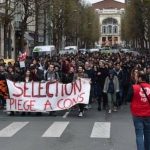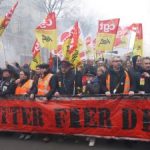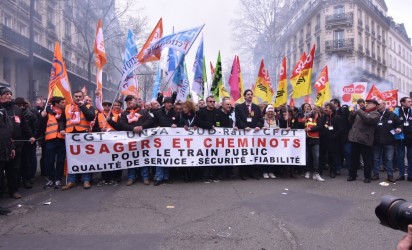AN ORDINARY WEEK IN FRANCE : from internal repression to the dropping of attack-missiles on Syria – The week just gone – 9 to 15 April 2018 – is typical of the on-going situation in France; it is symptomatic of the gulf growing increasingly between the social movements and the liberal policies of the government. Angry people stand up everywhere against the reform projects that president (Macron [1]) is rushing through at all speed and at all levels.
This president does not hesitate to lie to impose his views, although fewer and fewer people share them. His loss of support is confirmed in opinion polls, whilst opposition grows even in his own movement, La République en Marche (LREM).
Macron endorsed fully the use of disproportionate force by police and the CRS [2] against the students protesting in some universities, and against the ‘Zadists’ [3] in occupation on the site of Notre-Dame-des-Landes. A similar kind of violence is also used against the migrant populations through the use of the most repressive asylum-immigration laws [4], now being passed.
President Macron decided to drop missiles on Syria – and this with no debate whatever in the political arena. When you are the “chief of the Armed Forces”, like him, you do not need to show proofs before asserting that Bashar al-Assad has used chemical weapons [in Douma] – and that due to this, France is legitimately entitled to drop attack missiles on Syria.
Following this and to crown it all, president Macron gave two televised press conferences to extol his policies and the reforms which he has set in train. He used those occasions to explain that nothing can replace ‘order’ and ‘work’, and that he will defend such things till the end of his mandate.
The amplitude of the social movements:
This government demolishes systematically the public services and the social gains, as well as the individual and collective rights of people. There is an unprecedented level of anger in the social movements, affecting all the sectors of society as follows:
- Decline in the purchasing power of the pensioners who contribute more in tax – a kindly gesture on their part for which the president is most cynically thankful.
- The health and hospital workers had to strike for months to defend the quality of the services, their reward being the constant decline of their means.
- The railway workers and the SNCF personnel are on strike against the penetration of competition on the networks, and against the attacks on their working standards. Those standards being the reason for the deficits, according to Macron.
- The employees of all categories at Air France have endured a wage freeze since 2011. They announce a series of stoppages over the next 3 months to get at least a 6% wage rise, since they already lost 11,000 jobs in the last few years, and the company made €1,5 billion in profits in 2017.
- The legal profession and the magistrates are rebelling against the de-humanisation of justice.
- The College and Higher Education students have started mobilising against the Education Reform. The aim of this reform is to introduce new selection procedures for university entrance, as part of measures that deepen the social inequalities.
- The associations that defend migrants[5] are scandalised by the on-going attack on the right to asylum. The Immigration Bill presently under consideration reduces the window of opportunity to make applications. It doubles the time during which an undocumented person can be kept in holding centres; it facilitates expulsions from the country and it bans systematically the return to France.
- Many communal Mayors reject austerity. They object to having to make do with less and less financial means. They resent the increasing control of the State over their decisions.
Among these many fronts of struggle, let us not forget the thousands of employees and workers fighting against the de-localisations and the closure of jobs. Never have the benefits and the dividends been so large for the shareholders. The fiscal policies indulge the rich and the big enterprises, under the pretext that they must be able to re-invest in the country.
Social injustice grows more flagrant by the day. In less than one year, Macron and his ministers removed what was left of the collective fabric of society – the social State. The latter had been a solidarity system. It insured people against illness and unemployment; it defended the pensions and the Labour Code. N0w, with the growth of security operations due to the fight on terrorism – as we are told – individual and collective rights are disappearing. As the Sate of Emergency becomes institutionalised [6] new forms of control are being generalised to apply to militant protest. As Trade Unionists, whistle-blowers, those who support the migrants (and others) become criminalised, they get included in “the professionals of disorder” as Macron likes to call them.
The attacks of this president against the moral and republican values of the country are opening doors to extreme violence. This is happening all over, and in all kinds of ways. Exceptional repression is used against the social movements active in the country. In some of the president’s speeches, he rouses the anger of groups against other groups. His speeches saw division. He divides the struggles to stop them uniting. And he feels entitled to define which type of anger is legitimate, and which other type is not.
Repression in the universities :

The Vidal Education Reform law bears the name of the woman minister in charge of academic orientation and attainment. Now that the National Assembly and the senate have voted this law (15.2.18), big changes are coming to university access. Up to now, admissions could be by drawing lots when there were more applications than places. This law creates new norms of selection and social triage. What will happen to the students who don’t meet the norms? The right to universal higher education is being dropped. The need to open new pathways and to create more places is not being addressed, whilst the number of applicants is growing year by year.
In the public sector of higher education, student orientation is not used for the general interest. The guarantee of a university place for everyone is made to serve the reproduction and increase of social inequality. Student strikes and occupations have grown since the law was passed. There are protests in some fifteen universities, with the professors supporting. Quite a challenge to Macron’s beloved state of ‘order’!
In the night of 22-23 March 2018, a scandal broke out at the Montpellier University: Supported by the Dean, masked individuals armed with planks and batons ejected from the building the students occupying the law-school’s auditorium.
On 9 April, police evicted students from the University of Nanterre who were holding a general assembly there. In the same week, there were forcible evictions in other faculties – at the Sorbonne and Tolbiac[7] in Paris, and in other large towns. On all these occasions, Trade Union leaders were singled out for repression.
The education reforms come from political choices focused on student selection. In these political choices, there is more confrontation than dialogue. The government wants the college leavers to compete against each other for university places. The situation is tense, particularly as preparations have started for the commemoration of 50 years since May 1968. Although Macron says that: “the professionals of disorder must understand that we are in a State order” his attitude to order brings more rage and fury.
The repression of the Zadists at Notre-Dame-des-Landes (NDDL) :

Among the “professionals of disorder”, Macron includes the protestors still in occupation on publicly-owned land at Notre-Dame-des-Landes [8]. This occupation goes back many years [50 years by some accounts]. Three months ago, the government announced that the airport project was cancelled and that arrangements were being made to clear the area. Through their collective organisation there, the Zadists put an alternative agricultural project in place. The Macron government sees in this kind of thing “an exercise in the tyranny of minorities”.
At the crack of dawn on Monday 9 April, 2,500 gendarmes came to destroy everything. Here you could see the government’s complete contempt for people and for what people create. This violent deployment evicted some people and destroyed what they had built, but the result is even more anger all around. The occupation of these few hectares may have been illegal, but the land is publicly owned ! Immediately after the destruction, an important network of citizens organised for immediate solidarity to start rebuilding.
The Zadists and their supporters dare show the world what Macron calls “non-legitimate anger”. To tame this anger, his government moves at all speed ‘to get order respected’. But there is a deal of powerlessness in this action. A powerlessness and a hatred for what people create collectively, particularly when they do it outside all the norms of private property.

There is a sense of thwarted State authority behind the actions of this government. It reacts with actions to divide society, but the result is anger and social determination rising above their state of diffuse existence. The government’s attack on the Zadists had this particular effect, as shown by the immediate organisation of hundreds of citizens joining the Zadists to help them rebuild. Solidarity demonstrations took place as well in some big towns, in Nantes itself, and beyond [9].
The missile strikes against Syria :
The same violence underpins the sending of missiles to strike at Syria in the night of 13-14 April. Macron wants to be seen in the role of master of the world and leader of “an international coalition”. But the latter is only 3 countries: France, the US and the UK. This attack was launched the day before the International Commission of Enquiry was to reach Douma. The task of this Commission was to throw light on the presumed use of chemical weapons in Douma. This pre-emption dispensed the Western attackers of the need to cast more light on the matter, and it exempted them of the obligation to show the proofs [of Syria’s guilt] which they are supposed to have. But their problems remain, their biggest one being that the Syrian army is retaking control of a large part of the country. And this, with the help of Russia and Iran, and of China too.
This missile-attack evidences a powerlessness on the part of imperialism, because it had hoped to stop Syria defeating the terrorists.
The strategy put in place by the Western countries from 2011 onwards – with France closely involved [10] since it had returned to the Nato’s Integrated High Command [11] – consisted not in fighting terrorism, but in assisting the so-called Islamist ‘opponents’ in the elimination of Bashar al-Assad.
Now we are told that this missile attack intends “to have international right respected” through its ability to bring “a political solution” and “a durable transition” in Syria! Macron keeps saying that bombing a country is not the same as declaring war upon it – as if not everyone knew that. Adding that this Western missile attack was “an act of legitimate reprisals”.
In the not-so-glorious episodes in Iraq and Libya, we [the public] were told to admire the concepts of the “preventative war” and of “humanitarian war”. Now we are told to believe that a missiles-attack can bring peace and political settlement. Besides this notion being completely senseless, it has the potential to start a third world war as well.
Along with Macron’s alliance with Trump, the political class wonders how this attack on Syria came to be decided without debate in the National Assembly. If the Assembly is expected to make do with just being informed, but not to debate, what democracy is this that we are living under?
A Constitutional Reform Bill is under scrutiny at present. It plans to reduce drastically the number of MPs and Senators [12] – and it will suffer no amendment. As the government already works through ordinances, expect further powers to concentrate in the hands of One: the president of the Republic.
The French military budget is to pass from its €32.4 billion in 2017 to 295 billion in 2025 ! Seeing how Nato wanted this budget to reach 2% of GDP by 2025 (it is 1.7% at the moment) you can see what a good little Nato darling France is becoming.
Macron’s policies and the situation in the left :
Emmanuel Macron pushes his reform plans at very great speed. He has plans for all sectors: social housing, prisons, commercial secret, unemployment pay, professional formation, energetic transition, associative life, public functions, the Constitution. Private capital must drive everything. As public organisation is being dismantled, the individual and collective rights are being lost.
If you want to know where the president’s allies are, listen to what he says, or does not. Not for him to talk of ‘finance paradises’. By what he says, you would never guess that ‘fiscal gifts’ are handed over to some enterprises. When journalists probe about organised ‘fiscal evasion’ in big companies and the multinationals, all he talks about is “fiscal optimisation”.
The official bodies in charge of certain debates ‘on reforms’ are complete shams and substitutes for democracy. They only exist because of their ties to legal procedures. The ideas they raise have hardly any impact on what gets decided. All decision making is top-down, without debate, or relayed through panels that may occasionally attempt an amendment in the margin. Many government decisions are taken by ordinance. Some of the MPs belonging to Macron’s La République En Marche (LREM) express reservations, but when they object to the lack of debate and the bogus democracy, they are disciplined by party enforcers and threatened with consequences.
Capitalism needs more and more repression to affirm its power and all-powerfulness. In Europe, all the policies of the right-wing and extreme-right wing parties express this. And the same goes for France where Macron and his ministers are increasingly belligerent. Their speeches rouse people against each other: travelling public against the striking rail-workers; students keen to take their exams against the students on strike, etc. The Home Affairs Minister Gérard Collomb speaks in terms of “submersion migratoire”. When some of his LREM deputies (MPs) hinted at their wish to vote against his Immigration Bill, Collomb hit back with the threat to have them expelled from LREM [13].
Aware of the immense political deficit in the French left at the moment, Macron pushes his reforms through as fast as possible. The Socialist Party has become lifeless, having lost a large part of its members and officers. Following Hollande’s catastrophic tenure and the presidential elections of 7.4.2017, several splits developed in the Socialists, and even in their youth. The political weight of the Socialists is slight.
The Front de Gauche became diluted in political conflicts during the presidential campaign. The victory of Macron was made possible by the fact that so many left-wing militants voted for him to keep the National Front out. See the result today! Macron won with only 18% of those who actually voted [14]. This score was one of the worst achieved by any president of the Fifth Republic. On which side indeed is “the tyranny of the minorities”?
The task is to rebuild the strength of the left. Nothing else can counter the measures that capitalism is adopting today. France Insoumise seems stuck on Melanchon’s idea of him assembling all others, all by himself, as a movement, and not as a political party. Against the destructive plans of the Macron government, the idea of a most ample possible unification is rejected by Melanchon. Right now, it is urgent to unite the struggle of the Trade Unions with that of all the associations, around their shared objectives.

The turn that repression is taking against the social movements raises popular anger very high indeed. New possibilities are opening. Anti-government mobilisations are to take place on 19.4.18, and more later, throughout the country [15]. These tend to create movements of convergence and unity, behind the railway workers and with the support of the health workers, the students, the pensioners, etc – plus the left councillors and MPs. This is the condition indispensable to defend not only the public services, but our choices in the construction of another society.
17 avril 2018 – [translation and annotations 23.4.18]

















